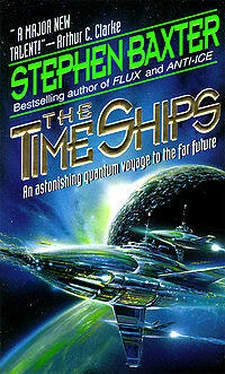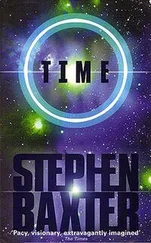Stephen Baxter - The Time Ships
Здесь есть возможность читать онлайн «Stephen Baxter - The Time Ships» — ознакомительный отрывок электронной книги совершенно бесплатно, а после прочтения отрывка купить полную версию. В некоторых случаях можно слушать аудио, скачать через торрент в формате fb2 и присутствует краткое содержание. Год выпуска: 1995, ISBN: 1995, Издательство: HarperCollins, Жанр: Фантастика и фэнтези, на английском языке. Описание произведения, (предисловие) а так же отзывы посетителей доступны на портале библиотеки ЛибКат.
- Название:The Time Ships
- Автор:
- Издательство:HarperCollins
- Жанр:
- Год:1995
- ISBN:0-002-24609-0
- Рейтинг книги:5 / 5. Голосов: 1
-
Избранное:Добавить в избранное
- Отзывы:
-
Ваша оценка:
- 100
- 1
- 2
- 3
- 4
- 5
The Time Ships: краткое содержание, описание и аннотация
Предлагаем к чтению аннотацию, описание, краткое содержание или предисловие (зависит от того, что написал сам автор книги «The Time Ships»). Если вы не нашли необходимую информацию о книге — напишите в комментариях, мы постараемся отыскать её.
by H. G. Wells, it was officially authorized by the Wells estate to mark the centenary of the original’s publication.
Won:
British SF Association Award in 1995
John W. Campbell Memorial Award for Best SF Novel in 1996
Philip K. Dick Award in 1996
Nominated for:
Hugo Award for Best Novel in 1996
Locus Award for Best SF Novel in 1996
Arthur C. Clarke Award in 1996
The Time Ships — читать онлайн ознакомительный отрывок
Ниже представлен текст книги, разбитый по страницам. Система сохранения места последней прочитанной страницы, позволяет с удобством читать онлайн бесплатно книгу «The Time Ships», без необходимости каждый раз заново искать на чём Вы остановились. Поставьте закладку, и сможете в любой момент перейти на страницу, на которой закончили чтение.
Интервал:
Закладка:
I felt I had emerged, at last, from out of the Darkness of evolutionary despair, and into the Light of infinite wisdom.
[7]
Emergence
But, you may not be surprised to read if you have followed me so far, this mood — it was a sort of elegiac acceptance — did not persist with me for long!
I took to peering about. I strained myself to hear, to see any detail, the slightest mottling in that shell of illumination that surrounded me; but for a while — there was naught but infinite silence, intolerable brightness.
I had become a disembodied mote, presumably immortal, and embedded in this greatest of artifices: a universe whose forces and particles were entirely given over to Mind. It was magnificent — but it was terrible, inhuman, chilling — and a sort of crushing dismay fell on me.
Had I passed out of being, into something that was neither being nor not being? Well, if I had — I was discovering — I did not yet have the peace of the Eternal. I still had the soul of a man, with all the freight of inquisitiveness and thirst for action which has always been part of human nature. There is too much of the Occidental about me, and soon I had had my fill of this interval of disembodied Contemplation!…
Then, after an unmeasured interval, I realized that the brilliancy of the sky was not absolute. There was a sort of hazing at the edge of my vision — the slightest darkening.
I watched for geological ages, it seemed to me, and through that long waiting the hazing grew more distinct: it was a sort of circle about my vision, as if I was peering out through the mouth of a cave. And then, in the middle of that spectral cave-mouth, I made out an irregular cloud, a mottling against the general glare; I saw a collection of rough rods and discs, all indistinct, arranged like phantoms over the stars. In one corner of this view there was a cylinder colored pure green.
I felt a passionate impatience. What was this irruption of shadows into the interminable Noon of this Optimal History?
The surrounding cave-shape grew more clear; I wondered if this was some submerged memory of the Palaeocene. And as for that misty collection of rods and discs, I was struck by an impression that I had seen this arrangement before: it was as familiar as my own hand, I thought, and yet, in this transformed context, I could not recognize it…
And then the realization rushed upon me. The rods and other components were my Time Machine — the lines over there, obscuring that constellation, were the bars of brass which made up the fundamental frame of the device; and those discs, wreathed about with galaxies, must be my chronometric dials. It was my original machine, which I had thought lost, dismantled and finally destroyed in that German attack on London in 1938!
The coalescing of this vision proceeded apace. The brass rods glittered — I saw there was a sprinkling of dust over the faces of the chronometric dials, whose hands whirled about and I recognized the green glow of Plattnerite which suffused the doped quartz of the infrastructure. I looked down and made out two wide, fat, darker cylinders — they were my own legs, clothed in jungle twill! — and those pale, hairy, complex objects must be my hands, resting on the machine’s control levers.
And now, at last, I understood the meaning of that “cavemouth” around my vision. It was the frame of my eye-sockets, nose and cheeks about my field of view: once more I was looking out from that darkest of caves — my own skull.
I felt as if I was being lowered into my body. Fingers and legs attached themselves to my consciousness. I could feel the levers, cool and firm, in my hand, and there was a light prickling of sweat on my brow. It was a little, I suppose, like recovering from the oblivion of chloroform; slowly, subtly, I was coming into myself. And now I felt a swaying, and that plummeting sensation of time travel.
Beyond the Time Machine there was only dark — I could make out nothing of the world — but I could feel, from its decreasing lurching, that the machine was slowing. I looked around — I was rewarded with the weight of a laden skull on a stem of a neck; after my disembodied state it felt as if I were swiveling an artillery piece — but there were only the faintest traces of the Optimal History left in my view: here a wisp of galaxy clusters, there a fragment of star-light. In that last instant, before my intangible link was finally broken, I saw again the round, solemn visage of my Watcher, with his immense, thoughtful eyes.
Then it was gone — all of it — and I was fully in myself again; and I felt a surge of savage, primitive joy!
The Time Machine lurched to a halt. The thing went rolling over, and I was flung headlong through the air, into pitch darkness.
There was a crack of thunder in my ears. A hard, steady rain was pounding with a brute force against my scalp and jungle shirt. In a moment I was wet to the skin: it was a fine welcome back to corporeality, I thought!
I had been deposited on a patch of sodden, soft turf in front of the overturned machine. It was quite dark. I seemed to be on a little lawn, surrounded by bushes whose leaves were dancing under the rain-drops. The rebounding drops shimmered about the machine. Close by I heard the bubble of a mass of water, and rain pattered into that greater mass of liquid.
I stood up and looked about. There was a building close by, visible only as a silhouette against the charcoal-gray sky. I noticed now that there was a faint green glow, coming from beneath the tipped-over machine. I saw that it came from a vial, a cylinder of glass perhaps six inches tall: it was a common eight-ounce graduated medicine bottle. This had evidently been lodged in the frame of the machine, but now it had fallen to the grass.
I reached to pick up the flask. The greenish glow came from a powder within: it was Plattnerite.
My name was called.
I turned, startled. The voice had been soft, almost masked by the hissing of the rain on the grass.
There was a figure standing not ten feet from me: short, almost childlike, but with scalp and back coated by long, lank hair that had been plastered flat by the rain against pale flesh. Huge eyes, gray-red, were fixed on me.
“Nebogipfel—?”
And then some circuit closed in my bewildered brain.
I turned, and inspected that building’s blocky outline once more. There was the iron balcony, over there the dining-room, the kitchen with a small window ajar, and there was the blocky form of the laboratory…
It was my home; my machine had deposited me on the sloping lawn at the rear, between the house and the Thames. I had returned — after all this! — to Richmond.
[8]
A Circle is Closed
Once more — just as we had done before, so many cycles of History ago — Nebogipfel and I walked along the Petersham Road to my house. The rain hissed on the cobbles. It was almost completely dark — in fact, the only light came from the jar of Plattnerite, which glowed like a faint electric bulb, casting a murky glow over Nebogipfel’s face.
I brushed my fingers over the familiar, delicate metalwork of the rail before the area. Here was a sight I had thought never to see again: this mock-elegant facade, the pillars of the porch, the darkened rectangles of my windows.
“You have both your eyes back,” I observed to Nebogipfel in a whisper.
He glanced down at his renewed body, spreading his palms so that the pale flesh gleamed in the light of the Plattnerite. “I have no need for prosthesis,” he said. “Not any more. Now that I have been rebuilt — as you have.”
I rested my hands against my chest. The shirt fabric was coarse, rough under my palm, and my own breast-bone was hard beneath. It all felt solid enough. And I still felt like me — I mean, I had a continuity of consciousness, a single, shining path of memory, which led back through all that tangling-up of Histories, back to the simpler days when I was a boy. But I could not be the same man — for I had been disassembled in that Optimal History, and remade here. I wondered how much of that shining universe remained in me. “Nebogipfel, do you remember much of it all — after we broke through that Boundary at the start of time — the glowing sky, and so forth?”
Читать дальшеИнтервал:
Закладка:
Похожие книги на «The Time Ships»
Представляем Вашему вниманию похожие книги на «The Time Ships» списком для выбора. Мы отобрали схожую по названию и смыслу литературу в надежде предоставить читателям больше вариантов отыскать новые, интересные, ещё непрочитанные произведения.
Обсуждение, отзывы о книге «The Time Ships» и просто собственные мнения читателей. Оставьте ваши комментарии, напишите, что Вы думаете о произведении, его смысле или главных героях. Укажите что конкретно понравилось, а что нет, и почему Вы так считаете.









